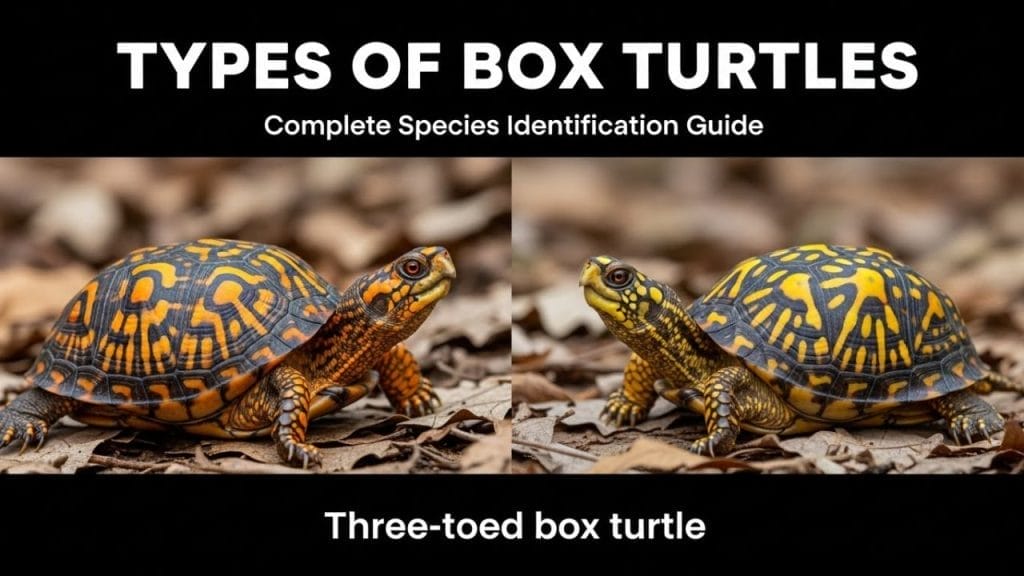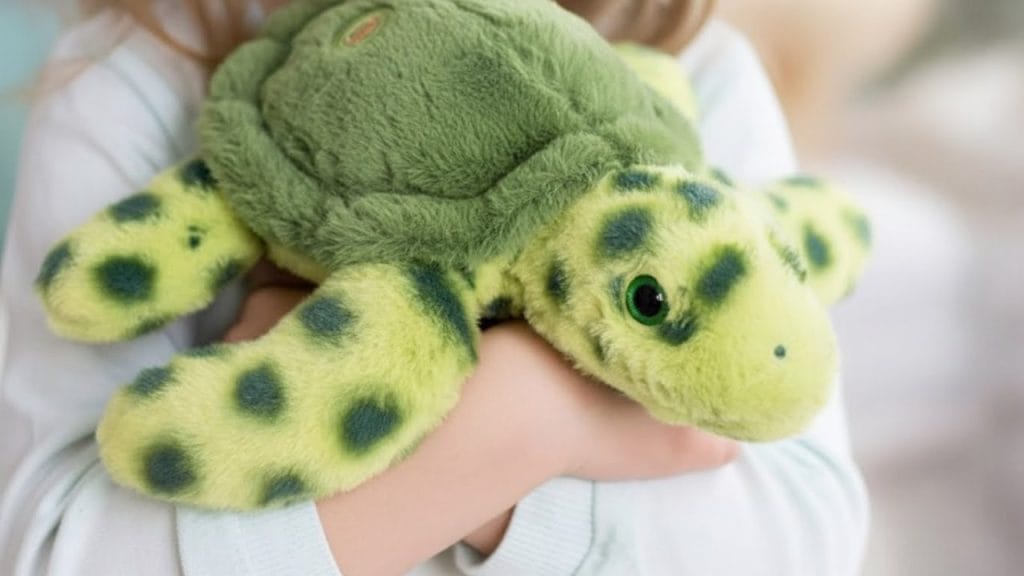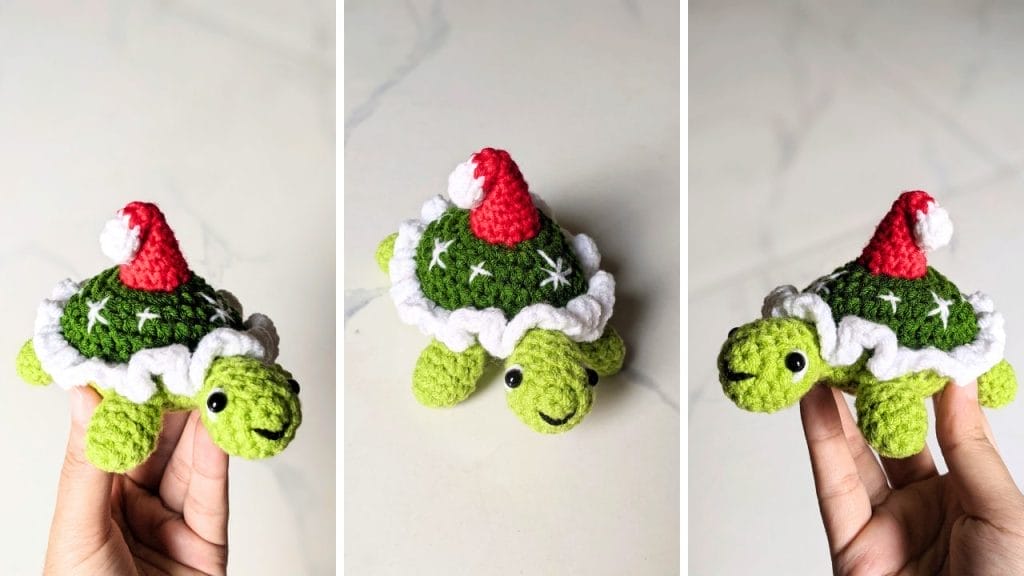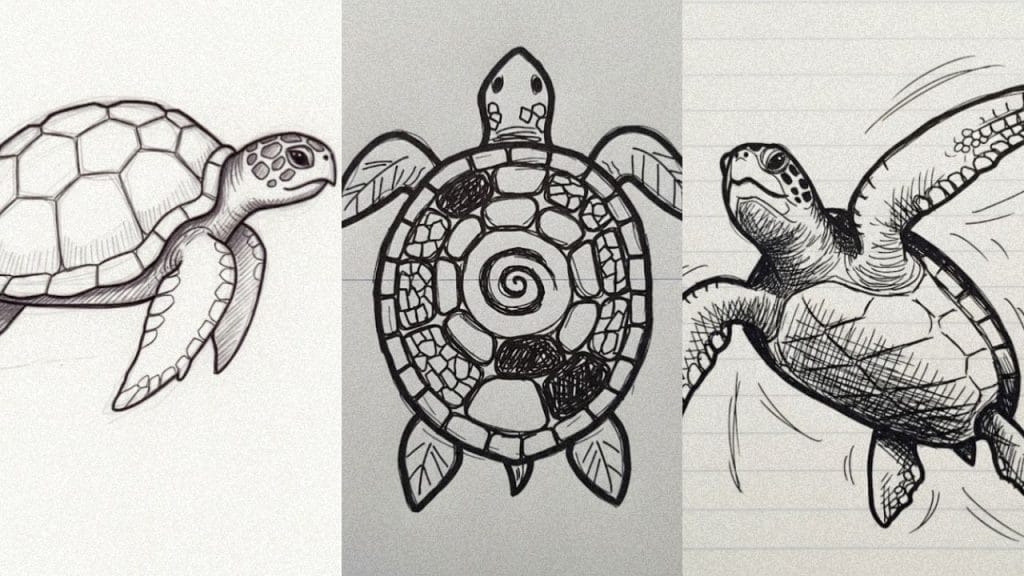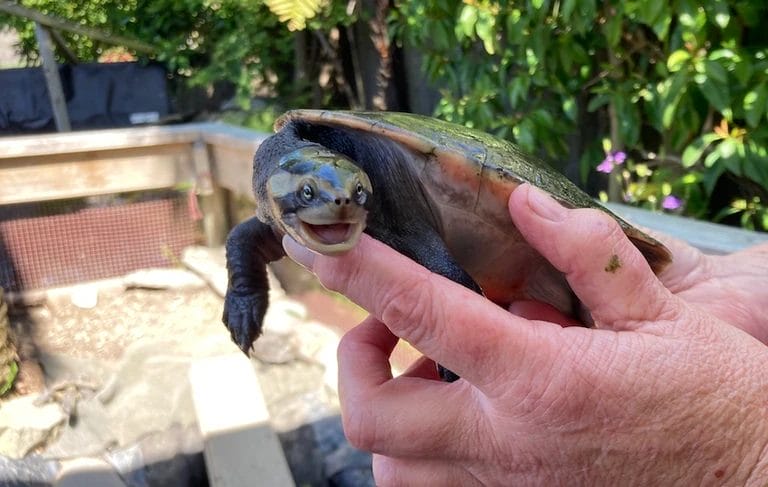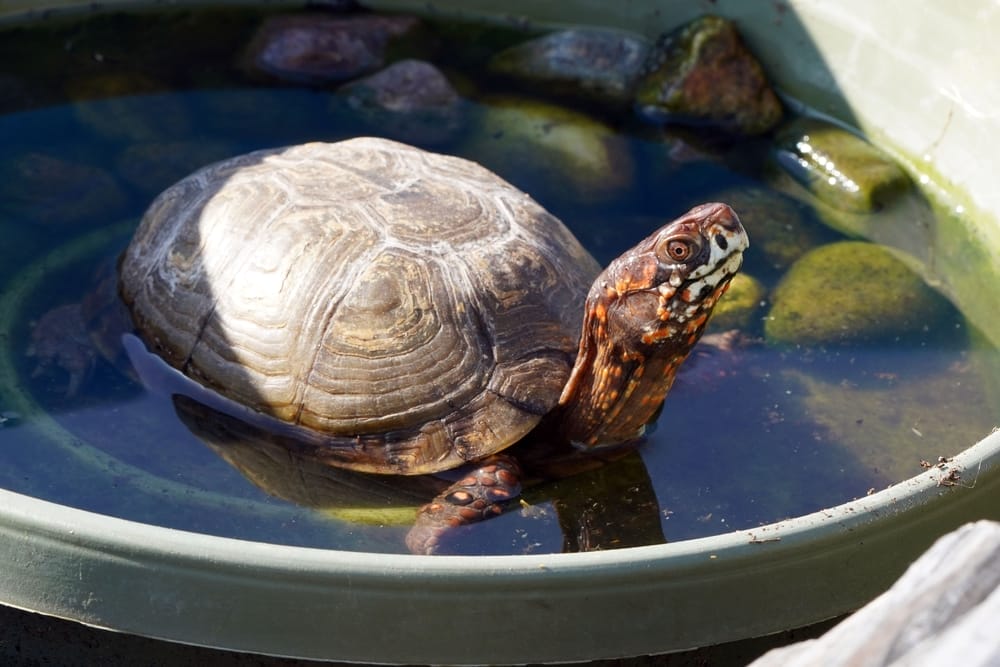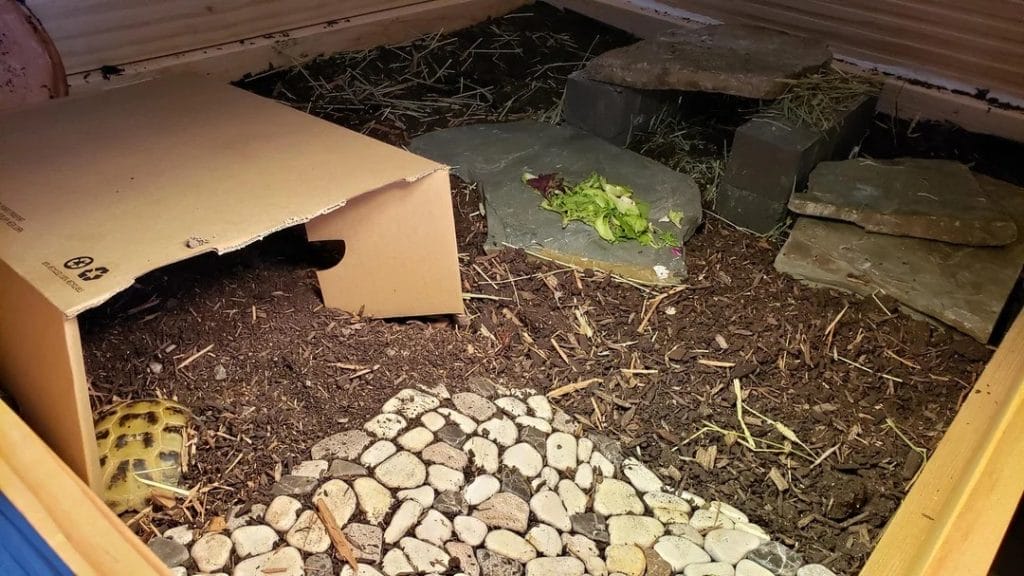What Human Foods Can Turtles Eat? [Food Chart]
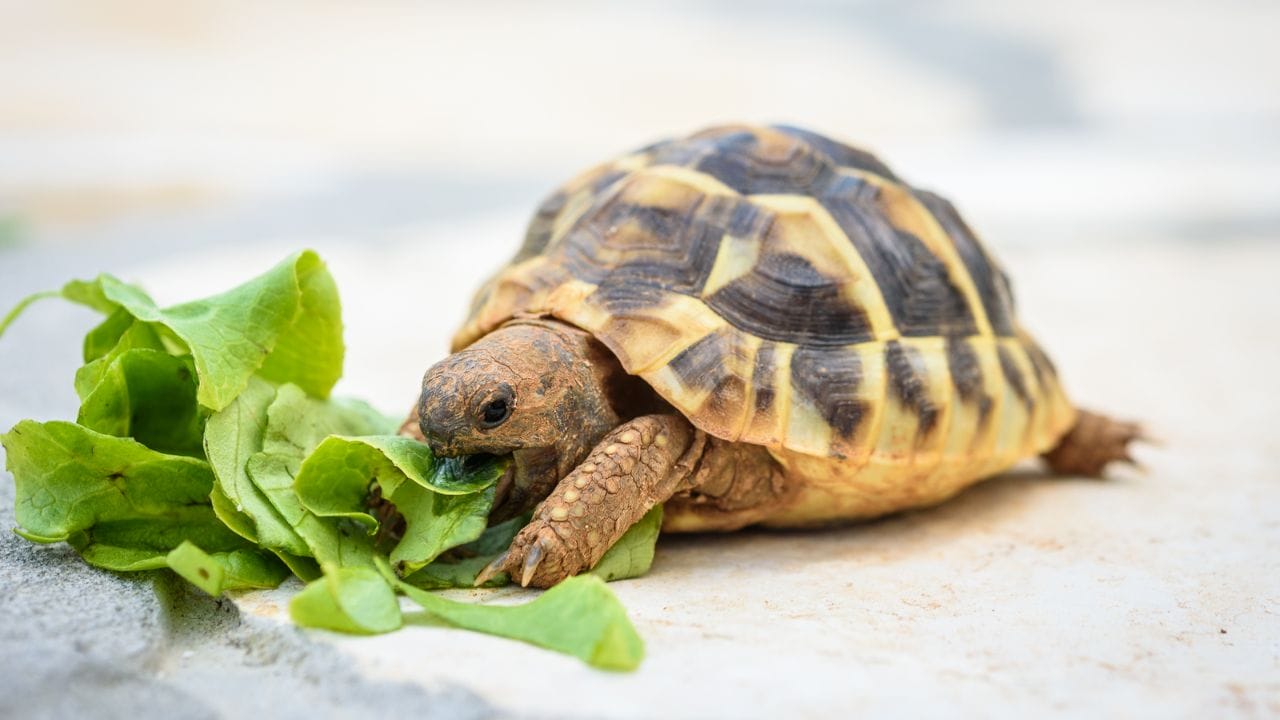
This post was created with help from AI tools and carefully reviewed by a human (Muntaseer Rahman). For more on how we use AI on this site, check out our Editorial Policy.
You’re standing in your kitchen, turtle buddy giving you those adorable begging eyes, and you’re wondering if you can share your dinner.
Plot twist: your shelled friend is way pickier than you think, and some “harmless” human foods could literally kill them.
The Big Picture (Before We Dive Into The Good Stuff)
Here’s the deal – turtles will eat almost anything you put in front of them. They’re like that friend who orders everything on the menu but then gets sick from mixing sushi with pizza.
Turtles don’t know what’s bad for them. In the wild, they never encounter chocolate, dairy, or processed foods, so they have zero instincts about avoiding human junk food.
Your turtle is counting on YOU to make smart food choices for them.

Safe Human Foods: The Green Light List
Vegetables (The Turtle Superfood Section)
These are your turtle’s best friends – pack them with vitamins and won’t cause digestive disasters.
Dark Leafy Greens (The MVPs):
- Kale – calcium powerhouse, but don’t go overboard
- Collard greens – turtle candy that’s actually healthy
- Mustard greens – spicy for us, perfect for them
- Dandelion greens – free turtle food from your yard (if pesticide-free)
- Romaine lettuce – way better than iceberg trash
Other Veggie Winners:
- Carrots (shredded) – great for vitamin A
- Green beans – crunchy fun
- Bell peppers (especially red ones) – turtles love bright colors
- Zucchini – mild and easy to digest
- Squash – another orange veggie winner

Fruits (The Occasional Treat Zone)
Think of fruits like turtle dessert – tasty but needs limits.
Fruit is a treat, not a staple. Overdoing it = diarrhea and messed-up calcium balance.
Box turtles can handle about 15% fruit in their diet. Aquatic turtles should get way less, like 5% maximum.
Safe Fruit Options:
- Apples (no seeds!) – classic crowd pleaser
- Bananas (with skin for box turtles) – potassium boost
- Berries (strawberries, raspberries) – antioxidant bombs
- Melons (watermelon, cantaloupe) – hydrating summer treats
- Grapes – cut them up to prevent choking
- Pears – sweet and gentle
For a complete breakdown of safe fruits and proper portions, see our detailed fruit feeding guide.
Protein Options (The Meat Department)
Your turtle needs protein, but not all human proteins are created equal.
The Good Stuff:
- Cooked chicken (no seasoning, no skin) – lean protein winner
- Hard-boiled egg whites – perfect protein packets
- Cooked fish (fresh tilapia, salmon, sardines – no seasoning) – way better than canned options
- Shrimp (cooked, no seasoning) – natural turtle food
Many common backyard worms are excellent protein sources—learn which ones in our safe worms guide.
The “Meh” Stuff (Occasional Only):
- Dog/cat food – not ideal but won’t kill them in small amounts
Want to get creative beyond simple vegetables and fruits? Learn how to make homemade turtle jello cubes and other nutritious recipes that combine these safe ingredients into turtle-approved meals.

This Hilarious Turtle Book Might Know Your Pet Better Than You Do
Let’s be real—most turtle care guides feel like reading a textbook written by a sleep-deprived zookeeper.
This one’s not that.
Told from the snarky point of view of a grumpy, judgmental turtle, 21 Turtle Truths You’ll Never Read in a Care Guide is packed with sarcasm, sass, and surprisingly useful insights.
And hey—you don’t have to commit to the whole thing just yet.
Grab 2 free truths from the ebook and get a taste of what your turtle really thinks about your setup, your food choices, and that weird plastic palm tree.
It’s funny, it’s honest, and if you’ve ever owned a turtle who glares at you like you’re the problem—you’ll feel seen.
The Danger Zone: Foods That Will Hurt Your Turtle
Absolute Never-Ever Foods
- Dairy Products: Turtles are 100% lactose intolerant. No cheese, milk, yogurt, ice cream, or butter. Ever. Their digestive systems literally can’t process dairy and it causes serious stomach problems.
- Chocolate: Contains theobromine and caffeine that are toxic to turtles. Even a small piece can be deadly. Keep your chocolate stash far away from your shelled buddy.
- Nuts: Loaded with oxalates that block calcium absorption. Since turtles need massive amounts of calcium for healthy shells, nuts are basically calcium kryptonite.
- This calcium-phosphorus balance is so critical that we’ve created a complete guide on providing calcium properly, including water blocks, dusting methods, and natural food sources.
- Processed/Fried Foods: French fries, chips, crackers, cookies – anything processed is nutritional garbage that can cause obesity and organ damage.
- Bread/Pasta: Dense carbs that turtles cannot digest properly. These can cause fatal impaction (think turtle constipation from hell).
Sneaky Dangerous Foods
- Avocado: Toxic to most pets, including turtles. That trendy guacamole could be a death sentence.
- Raw Meat: Salmonella and E. coli risks are real. Always cook meat for your turtle.
- Garlic & Onions: Toxic to most pets. Keep your Italian seasoning away from turtle food.
- Iceberg Lettuce: Not poisonous, just useless. It’s basically crunchy water with zero nutrition.
- Spinach: Here’s the weird part – spinach has calcium, but also has oxalic acid that blocks calcium absorption. It’s like giving your turtle a calcium supplement and calcium blocker at the same time.
- Pet Store Dried Shrimp: Those little jars seem convenient, but they’re basically turtle junk food. Okay as a rare snack, but definitely not a diet staple.
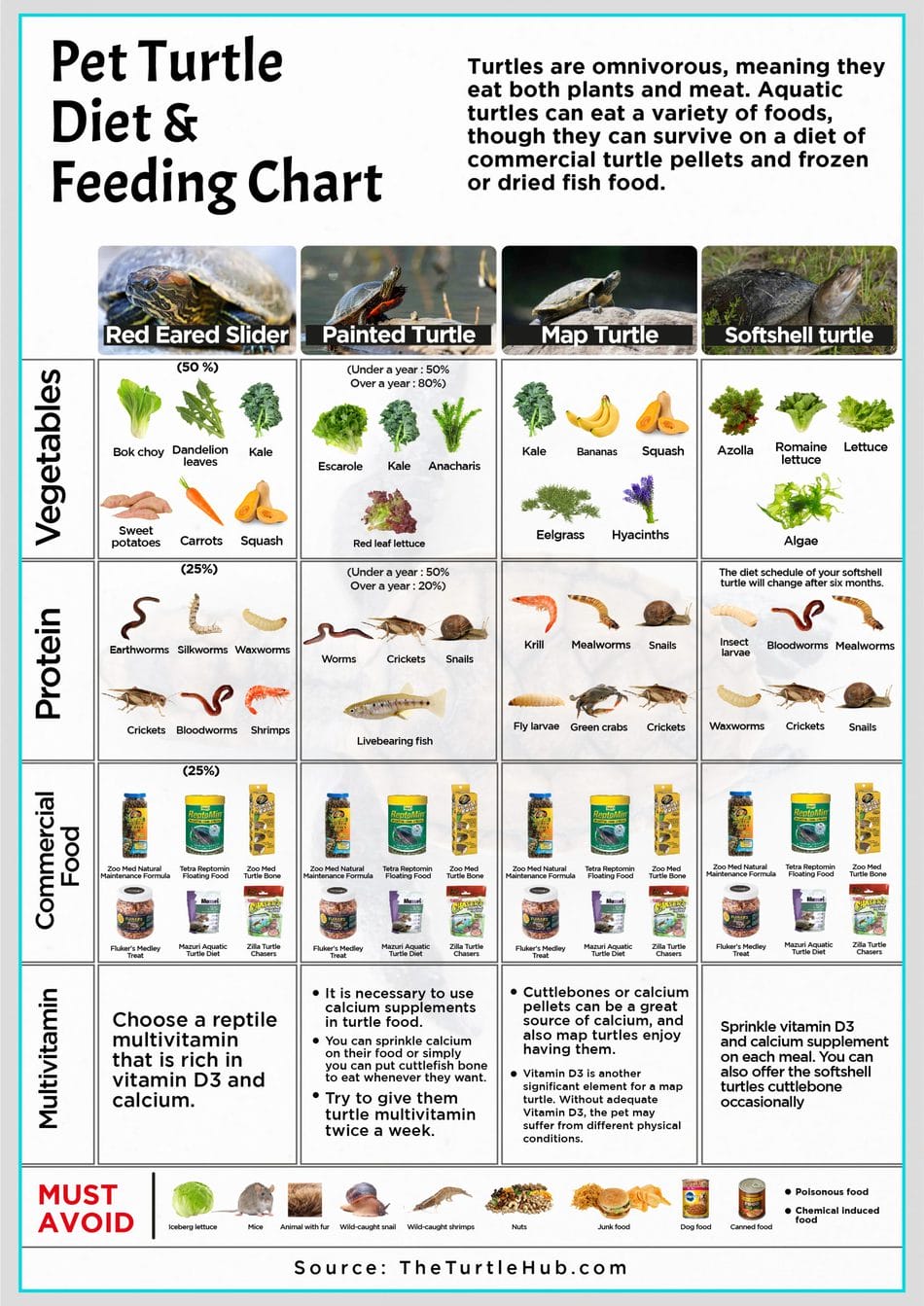
The Ultimate Turtle Food Safety Chart
| Food Category | Safe Options | Dangerous Options | Notes |
|---|---|---|---|
| Vegetables | Kale, collards, mustard greens, carrots, bell peppers | Spinach, iceberg lettuce, onions, garlic | Dark leafy greens are best |
| Fruits | Apples, berries, melons, grapes | Avocado, citrus fruits | Limit to 5-15% of diet |
| Proteins | Cooked chicken, egg whites, cooked fish | Raw meat, nuts, processed meats | Always cook meat first |
| Dairy | NONE | All dairy products | Turtles are lactose intolerant |
| Grains | NONE recommended | Bread, pasta, crackers | Hard to digest, no nutrition |
| Treats | Small pieces of safe fruits | Chocolate, candy, cookies | Stick to natural treats |
Species-Specific Rules (Because Not All Turtles Are The Same)
Box Turtles
Can handle more fruit in their diet (up to 15%). They’re also better at digesting varied foods since they’re naturally omnivorous.
Box turtle owners should check our vegetable guide for box turtles since their needs differ from aquatic species.
Aquatic Turtles (Red-Eared Sliders, etc.)
Need less fruit (5% max) and more vegetables as adults. They eat and swallow underwater, so all food needs to go in their water tank.
Baby Turtles vs. Adults
Babies need more protein for shell growth. Adults need more vegetables. It’s like how human toddlers need different nutrition than adults.
For a complete feeding schedule tailored to hatchlings, juveniles, and adults with specific portion sizes, see our guide on how often to feed turtles at different ages.
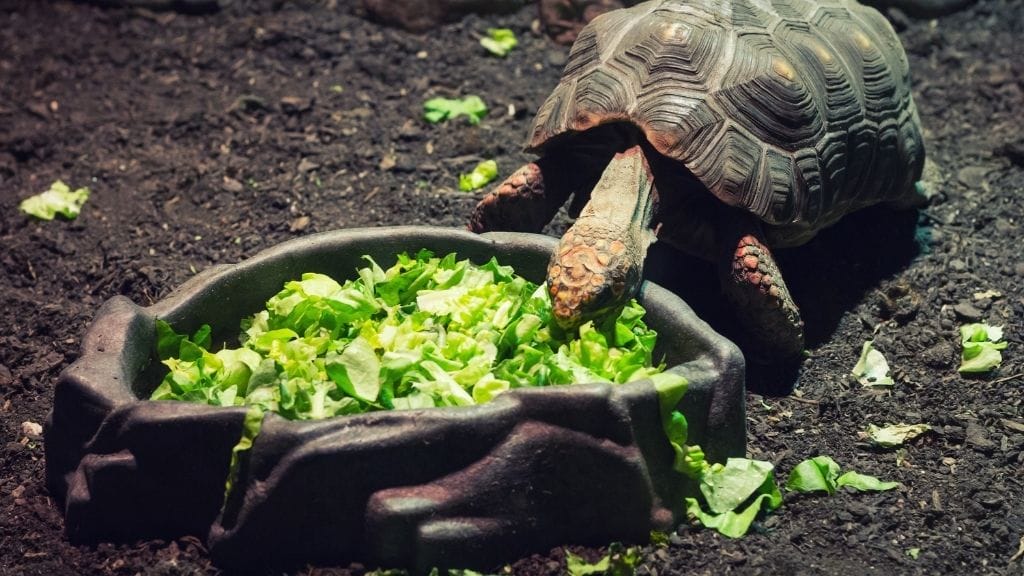
Real Talk: Common Turtle Owner Mistakes
Mistake #1: “But my turtle LOVES bread!” Yeah, and kids love candy for breakfast. Doesn’t mean it’s good for them.
Mistake #2: “I’ll just give them a tiny piece of chocolate.” There’s no “safe” amount of chocolate for turtles. Zero. None. Nada.
Mistake #3: Feeding the same foods every day. Turtles need variety just like humans. Mix up those vegetables and keep mealtime interesting.
Mistake #4: Using wild-caught insects or fish. These can carry parasites and diseases. Stick to store-bought or home-raised options.
The Feeding Schedule That Actually Works
Baby Turtles: Feed daily (they’re growing fast) Adult Turtles: Every 2-3 days (they’re not as active)
The 80/20 Rule: 80% vegetables, 20% protein for adult turtles. Flip this ratio for babies.
Emergency Signs: When Human Food Goes Wrong
If your turtle ate something they shouldn’t have, watch for:
- Diarrhea or constipation
- Loss of appetite
- Lethargy (more than usual turtle slowness)
- Vomiting (yes, turtles can vomit)
When in doubt, call your exotic vet immediately. Don’t wait to “see what happens.”

The Bottom Line (What Every Turtle Owner Needs To Know)
Your turtle will eat almost anything, but that doesn’t mean they should.
Stick to the basics: dark leafy greens, some safe vegetables, minimal fruit, and properly prepared proteins. When you’re tempted to share your pizza or ice cream, remember that your turtle’s life literally depends on your food choices.
They can’t read ingredient labels or know that chocolate is toxic – that’s your job.
Your shelled friend is counting on you to be the smart one in this relationship. Don’t let them down by taking shortcuts with their nutrition.
Pro tip: When grocery shopping, think “what would a turtle find in the wild?” If the answer is “definitely not Cheetos,” then skip sharing that particular snack.

About Author
Muntaseer Rahman started keeping pet turtles back in 2013. He also owns the largest Turtle & Tortoise Facebook community in Bangladesh. These days he is mostly active on Facebook.


